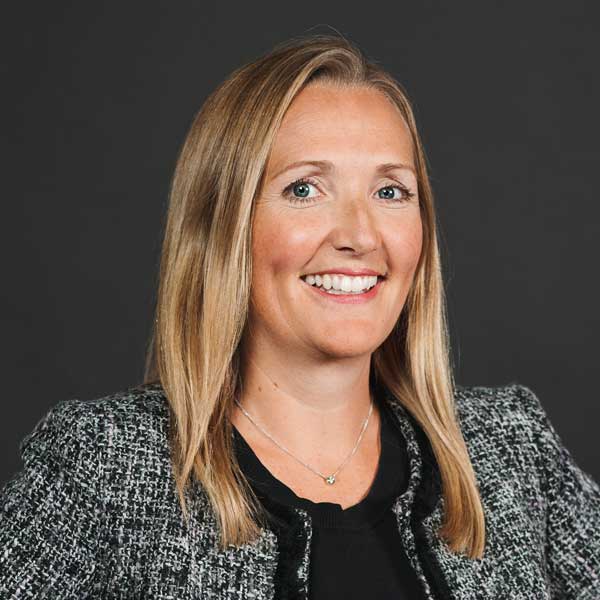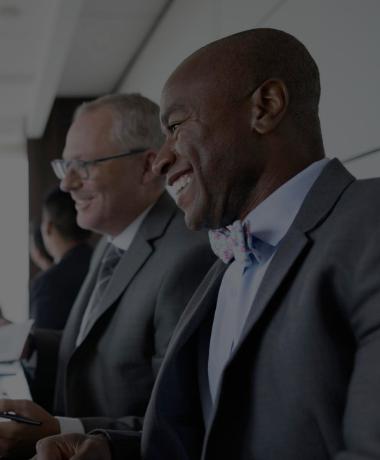A Conversation With Ina Strand

Ina Strand
Chief People Officer for Alimentation Couche-Tard
CliftonStrengths Top 5: Learner | Responsibility | Individualization | Empathy | Achiever
Alimentation Couche-Tard (ACT) started in 1980 with one convenience store in Laval, Quebec, owned and operated by Alain Bouchard. He expanded his one store to over 14,000 more through rapid acquisition, now called the "double again strategy" -- often acquiring companies larger than his own. Today, ACT operates in more than 26 countries and territories under the Couche-Tard, Circle K and Ingo brands.
The company selects its acquisitions very carefully and keeps a sharp eye out for talent, says Chief People Officer Ina Strand. Both habits explain why ACT made Strand -- famous in leadership circles for breaking several glass C-suite ceilings before she was 40 -- its first CHRO. Though she says she "wouldn't have been on any headhunter's list" for a U.S.-based CHRO/CPO role, CEO Brian Hannasch knew Strand had the chops to develop ACT's employee value proposition (EVP), "Growing Together," and then bring it to life.
The EVP describes ACT's expansion model -- which makes it impossible for executives to oversee talent by visiting every store every year, the way Bouchard once did -- as well as employees' vast development possibilities in a company doubling every few years. Strand's mandate is to map best practices and build the systems, processes and HR capacities that enable ACT employees to develop along with the company.
Strand herself is a role model of that EVP, as she relates in the following CHRO Conversation. And by building its development infrastructure and scaling it big and fast, Strand means to "make it clear that if you are the right person, leave the rest to us," she says. "We will help you get that growth journey with us."
Emond: Tell me about your EVP, "Growing Together."
Strand: It's an interesting story. Alain Bouchard and his company's co-founders built Couche-Tard with their bare hands into a company capable of doubling every third or fifth year. That's why our EVP is called "Growing Together." We are always growing as a company through acquisitions, and through that growth, we're able to offer people exceptional careers and personal development for their own growth. And the longer you've been here, the more true and compelling our Growing Together value proposition feels. One of our top leaders started as a third-shift associate in the company and is now an executive vice president. I'm our first HR officer, only four years after being acquired myself, and we had no executive and/or global HR management experience at all when I started. Often, employees say that they've been with us a long time but don't feel that they've stayed in the same company. I would say that. I've never been in the same job for very long.
Emond: Speaking of, how did you arrive at ACT?
Strand: My master's degree is in finance, leadership and engineering all in one. With that, I ventured into consulting until one of my clients, Statoil [Fuel and Retail ASA], pulled me out to work with people development, building on what I'd done as a consultant with organizational change. Eight or nine months after that, I was promoted to be the first woman on Statoil's Norway management team. After a couple of months, I became the deputy country manager and marketing director of the Norwegian entity, and my very broad understanding of the business side was developed during that period.
Emond: So, you weren't long out of college.
Strand: I was 27 or so, and there was a big deal made about that in the media at the time. One of the business magazines had a cover article called "Norway's Youngest Director" because I was the first woman and I was under 30 with so much responsibility in one of the top brands in Norway -- Statoil is a huge part of the Norwegian identity. Then Jacob Schram approached me for a role in a new entity at Statoil. We had the adventure of carving out an entity and listing it on the Norwegian stock exchange. But we were listed for less than a year before ACT secured our portfolio and bought up the company in 2012. At first, we were disappointed because our adventure was over, but were soon very surprised by ACT and its decentralized, noncorporate leadership style.
Emond: How so?
Strand: It was very different from what we were used to in "Big Oil." ACT leadership didn't want long memos; it was more, "Put three things on a PowerPoint and tell us what you want to achieve." It showed us an openness to new ideas and a learning orientation. Decisions were made based on "that sounds smart; let's do it." From the beginning, they wanted to identify talent, like me, to work on important assignments. Then, amazingly, other parts of the business welcomed us with open arms. From the shock of being acquired, we very shortly began to admire these leaders.
Emond: Was the Growing Together concept already in place?
Strand: Not as an EVP, but as my own story shows, Growing Together was certainly part of the culture, part of the "double again strategy," part of growth through acquisitions. The real difference is that it was a financial proposition rather than a people proposition. Our first Gallup Q12 assessment was in 2016, and we were at the 48th percentile. Pa [Sinyan, Gallup Managing Partner] was surprised that we didn't come in lower based on how little infrastructure we had around people. ACT had the mindset that we want to help you grow and learn, but it wasn't articulated in HR policies.
"Growing Together was certainly part of the culture, part of the 'double again strategy,' part of growth through acquisitions. The real difference is that it was a financial proposition rather than a people proposition."
Emond: That makes me curious about your Q06 results. [The sixth item on Gallup's Q12 engagement assessment asks employees to rate how strongly they agree with the statement, "There is someone at work who encourages my development."]
Strand: We're at the 92nd percentile on Q06; the 85th percentile overall.
Emond: Jumping from the 48th percentile to the 85th so quickly is really impressive. But getting to the 92nd percentile on Q06 is exceptional. It really speaks to being an extreme growth and development culture -- that Growing Together is real at ACT.
Strand: It really is. I'm an example of it. I was the first woman to ever be brought on to the executive team, so not only was this all-male, all-white, 50-something executive team who were very much operators creating a new HR executive position, they opened it up to a 39-year-old Norwegian woman with the mandate that I would not be purely HR/ benefits but a Chief People Officer making Growing Together a true employee brand. And I wouldn't have been on any headhunter's list as a CPO. I was in Norway, primarily working with marketing, moving to the U.S. from Scandinavia, which is far more advanced on gender diversity. The U.S. is just a different planet on gender diversity from what I experienced. But Brian wanted more than an HR person. He wanted someone to bring all the important elements of our culture into systems -- take all that culture and transform it into ways of operating. We'd grown so large we were no longer capable of doing that just by pure leadership; we couldn't touch enough people to bring culture to life.
Emond: Speaking of DEI, do you have a Chief Diversity Officer?
Strand: I don't have a Chief Diversity Officer or anyone on my team who works specifically with diversity. Everyone owns it. Brian is super passionate about D&I. When I started, he asked about my experiences living in Scandinavia, and what I thought we should do to change things quickly. We started with gender diversity, and after a year, it evolved into so much more. I think that's our success formula: The global HR team has solutions, and our operators have metrics. They drive the results, and we help scale them. A huge part of the work that I've been doing is to map all of our best practices and find effective ways to scale, building the tools and infrastructure -- drive all of our best practices through core HR and learning modules and everything else. That's where my engineering background, which is more about creating systems and procedures, came in. My intellectual curiosity is around how to make things less complicated, to oversimplify, so we can drive speed in the execution. That's really why Brian asked me to be CPO, not my HR qualifications, which is just another proof point of ACT taking a chance on someone. That, and I had been in the organization for a long time, living that culture, and being a role model of Growing Together.
Emond: And when you joined, there wasn't a global people function at all.
Strand: That's right. Our leaders and managers believed in talent selection, but not in the traditional HR systems point of view … rather just by doing it, by taking a chance on someone, specifically people who want a challenge. We have our acquisition framework -- the financials and all the things we look for in a target -- that makes us very confident, and because we grow so quickly, we get access to talent through those acquisitions. A thing that's really different about ACT is that rapid growth always makes us feel like a startup. And our operating model is not to come in and force our way of doing things on the new company. We're always looking for the benefits of the new group, and each new company has to do something better than us. We're always looking for the one or two or five things that a company is excellent at that we don't do. Being constantly on the lookout for talent is a component of that.
Emond: Can you give me an example of "excellent at"?
Strand: So, when I was at Statoil, we were good on brand, which was something ACT wasn't focused on at all. At the time, ACT had multiple brands, a portfolio of things that were not recognizable to most consumers, and the leaders were really intrigued by Statoil's brand-building. That became a global initiative for ACT. Or, when we acquired the Holiday stores in the United States, they had excellent food programs. We were like, "Let's get that food program, understand that food program and roll it out to all the other stores in the United States." It's just part of our learning orientation and our openness to new ideas. But as we grow, those elements became more and more complicated to deliver. Our CEO and COO used to be able to visit all the stores on a regular basis and meet all the management teams. They knew everyone. But we've doubled so many times that now it's impossible for management to have that much overview. We had to take that way of learning and leading and turn it into systems for a global organization. That's the idea behind Growing Together.
"Our leaders and managers believed in talent selection, but not in the traditional HR systems point of view … rather just by doing it, by taking a chance on someone, specifically people who want a challenge."
Emond: How do you communicate the idea of Growing Together?
Strand: Right now, our focus is on entry-level positions, so Growing Together is part of our portals, part of the recruitment process. It's in some onboarding and some workshops. We literally bring the idea to life in our "welcome to the team" tool kit in some markets with a cup and a seed you can plant in it, with a little story about growing together. And since transportation is such a big part of what we do, we give employees a chart, like a Metro or bus chart, that portrays all their different growth journeys. Employees see how they can start on one road, such as in a Circle K store, then jump on another road and make a career in corporate. We make it clear that if you are the right person, leave the rest to us. We will help you get that growth journey with us.
"Employees see how they can start on one road, such as in a Circle K store, then jump on another road and make a career in corporate."
Emond: Not many people get to build their own HR function, their own CPO role. What's the best part of that?
Strand: Working with our people. It sounds like a cliche, but it really is. We impact people so directly with our work. You can feel that when engagement results come back, when all the things we've been working on start to come through. But what I really love is building teams. I love how the outcome is bigger than the sum of the parts. At ACT, we're able to see unique talents and we're flexible enough to accommodate people's personal interests or strengths. We're a little bit untraditional in terms of how we divide work, how we collaborate, how we pull in different backgrounds, different kinds of impact, different kinds of thinking, so that everyone gets into that flow. I love that. I really do love that.
Jennifer Robison contributed to this article, which was based on an interview conducted by Larry Emond.



